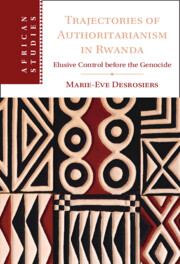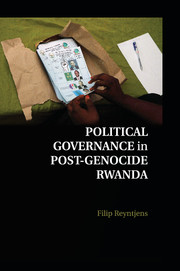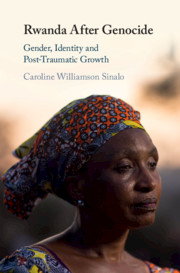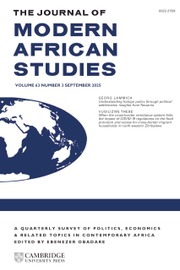Trajectories of Authoritarianism in Rwanda
Challenging assumptions regarding the strength and control of authoritarian governments in Rwanda in the decades before the 1994 genocide, Marie-Eve Desrosiers uses original archival data and interviews to highlight the complex relations between authorities, opponents, and society. Through careful, detailed analysis Desrosiers offers a nuanced assessment of the functions and evolution of authoritarianism over time, demonstrating how the governments of Rwanda's first two post-independence Republics (1962–1990) sought and often struggled to cement their rule. Whilst the deeper, lived realities of authoritarianism are generally neglected by multi-cases comparisons at the heart of comparative authoritarian studies, this illuminating survey highlights the essential, yet subtle authoritarian strategies, patterns, and forms of decay that are too often overlooked when addressing authoritarian contexts.
- Uses original archival and interview material to offer readers a rich alternative history of the decades before the Rwandan genocide to challenge the assumed stability of the First and Second Republics
- Develops a new conceptual and theoretical methodology for the study of authoritarianism
- Offers a counter to debates that are centred predominantly on crises and elites by focusing on developments that took place during peacetime and at a local level
Reviews & endorsements
'Desrosiers’ thoughtful analysis of a rich array of archival materials and original interviews offers readers an unparalleled ‘granular’ account of Rwanda’s First and Second Republics. The result is an essential text that promises to have a transformative impact on current understandings of these often-oversimplified regimes and studies of authoritarianism.' Erin Jessee, University of Glasgow
'This book fills a surprising gap in scholarship on Rwanda by providing a detailed analysis of the first two post-colonial governments. Desrosiers uses the Rwanda case to challenge existing simplistic ideas about authoritarian regimes, making this essential reading not only for those interested in Rwanda but for anyone interested in governance and authoritarianism.' Timothy Longman, Boston University
'Based on impeccable archival research and a mastery of the secondary literature, this work stresses the constant ‘political grind’ required to maintain authoritarian structures in Rwanda before the genocide. Desrosiers reminds us that the trajectory of such regimes consists only of ‘elusive control’, and lays new foundations for understanding both authoritarian dynamics and post-genocide Rwandan politics.' David Newbury, Smith College
'This is a lively contribution to the literature on authoritarianism. Closely observed and richly described, Desrosiers convincingly argues for a nuanced understanding of Rwanda’s postcolonial regimes. In investigating the banal uncertainties of authoritarian rule, Desrosiers provides a brilliant interpretation of Rwanda’s pre-genocide period.' Susan Thomson, Colgate University
‘… there should be no doubt that this is the book to which anyone wishing to understand Rwanda’s postcolonial, pre-genocide period should turn. There is no better account of this period of the country’s history.’ Omar Shahabudin McDoom, Perspectives on Politics
Product details
January 2023Hardback
9781009224789
279 pages
235 × 158 × 28 mm
0.73kg
Available
Table of Contents
- Trajectories of authoritarianism: An introduction
- 1. The study of authoritarianism, including in Rwanda
- 2. Should Rwanda matter to the study of authoritarianism?
- 3. Some background: Timelines, beginnings and endings
- 4. The shape of authoritarianism in pre-genocide Rwanda
- 5. Communicating norms for behaviour
- 6. Challenges to the monopoly of legitimate violence
- 7. Competition around and within the security sanctum
- 8. The political and economic grind
- 9. Individual and local trajectories
- Conclusion
- Bibliography.








